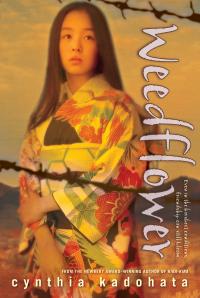About the Book
Twelve-year-old Sumiko feels her life has been made up of two parts: before Pearl Harbor and after it. The good part and the bad part. Raised on a flower farm in California, Sumiko is used to being the only Japanese girl in her class. Even when the other kids tease her, she always has had her flowers and family to go home to.
That all changes after the horrific events of Pearl Harbor. Other Americans start to suspect that all Japanese people are spies for the emperor, even if, like Sumiko, they were born in the United States! As suspicions grow, Sumiko and her family find themselves being shipped to an internment camp in one of the hottest deserts in the United States. The vivid color of her previous life is gone forever, and now dust storms regularly choke the sky and seep into every crack of the military barrack that is her new “home.”
Sumiko soon discovers that the camp is on an Indian reservation and that the Japanese are as unwanted there as they’d been at home. But then she meets a young Mohave boy who might just become her first real friend… if he can ever stop being angry about the fact that the internment camp is on his tribe’s land.
With searing insight and clarity, Newbery Medal-winning author Cynthia Kadohata explores an important and painful topic through the eyes of a young girl who yearns to belong. Weedflower is the story of the rewards and challenges of a friendship across the racial divide, as well as the based-on-real-life story of how the meeting of Japanese Americans and Native Americans changed the future of both.
Pre-Reading Activity
- Ask students to write a paragraph about what they think racial and ethnic profiling means. Invite them to share their paragraphs in class. Engage them in a discussion about how Americans continue to practice ethnic profiling today.
Discussion Questions
- Sumiko was very excited to be invited to Marsha’s birthday party, but felt completely humiliated once she arrived. Why doesn’t she tell Uncle and Jiichan about the situation, but shares the news with Bull? What do you think Marsha feels when her mother sends Sumiko away?
- Jiichan described his trip from Japan to Sumiko: “The thing that kept everybody going was a single word: America.” Why did Jiichan feel that the word America was the most important thing his family owned? How did America betray him?
- Why does the camp at Poston feel “final” to Sumiko? She doesn’t want to leave when Auntie finds a job in a sewing factory near Chicago. Why does Uncle Kenzo tell her that she belongs with Auntie? Explain why Sumiko feels like an orphan when she leaves the camp. How does leaving the camp help her understand the real reason why Jiichan came to America?
Extension Activities
- Kadohata uses similes to create certain images (e.g. in reference to the neglected flower fields, “It was almost like watching an animal die and not trying to help”). Find other similes in the novel.
- The newspaper at the camp is called the Poston Chronicle. Ask students to write an article about one event at the camp that might be featured in the Poston Chronicle. For example: Mr. Moto’s garden, the Christmas celebration, etc.
